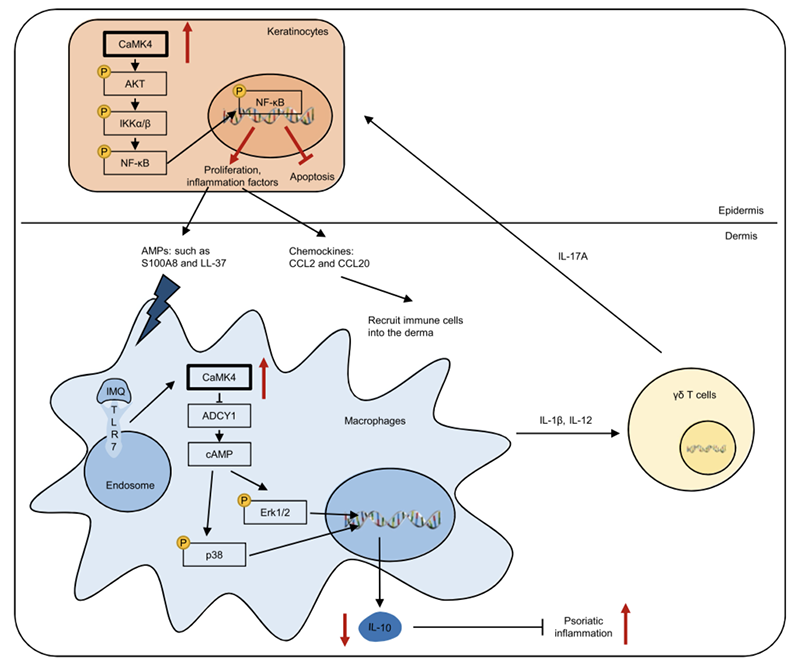Activity lecture location:Home≡Activity lecture≡Details
Nature sub-issue: Sun Liangdan's team reveals the mechanism of CaMK4 in psoriasis
Source:Chinese Psoriasis Congress Date:2022/07/24 Browse:1519 second
On July 22, 2022, the team of Sun Liangdan of the First Affiliated Hospital of Anhui Medical University, the Key Laboratory of Dermatology of the Ministry of Education of Anhui Medical University, the Institute of Dermatology of Anhui Medical University, and the Laboratory of Inflammatory and Immune Diseases in Anhui Province published in Nature, a sub-journal of Nature. A research paper entitled "Calcium/calmodulin-dependent protein kinase IV promotes imiquimod-induced psoriatic inflammation via macrophages and keratinocytes in mice" was published in Communications (IF:17.694, CiteScore:23.2). The Department of Dermatology, The First Affiliated Hospital of Anhui Medical University is the first author and the corresponding author unit.

Psoriasis is a chronic inflammatory skin disease mediated by heredity, environment and immunity. The clinical manifestations are red papules and plaques covered with thick silvery-white scales. Various diseases, such as diabetes and metabolic syndrome, bring a heavy burden to patients and society. There are about 125 million patients worldwide and about 6.5 million in China. Although new treatments such as a variety of biologics have emerged, currently there is no cure for psoriasis. A variety of inflammatory cell types exist in psoriasis lesions, including dendritic cells, neutrophils, macrophages, T cells, etc., which contribute to disease pathogenesis, drive keratinization, and stimulate keratinocyte proliferation. Feedback loops between innate immune cells (neutrophils, macrophages, dendritic cells, etc.) and acquired immune cells (T cells) lead to amplification of the inflammatory response, among which myeloid cells, T cells, keratinocytes Cells play a major role, and the C/IL-23/T-17 cell/IL-17/KC axis is a key component of the positive feedback loop that promotes the development of psoriasis. Cells and cytokine networks play a key regulatory role in psoriasis, suggesting a new avenue for us to find therapeutic targets for psoriasis. CaMK4 belongs to the serine/threonine kinase family and regulates the expression of various genes, such as IL-2 and IL-17.
CaMK4 has an important role in autoimmune diseases, while the role of CaMK4 in psoriasis is unclear. This study found that CaMK4 expression was significantly increased in skin lesions of psoriasis patients compared with healthy human skin; CaMK4 expression was found in imiquimod (IMQ)-induced psoriasis mouse skin lesions compared with healthy mouse skin A significant increase. The severity of psoriasis was reduced in IMQ-induced Camk4-deficient (Camk4−/−) mice compared with IMQ-induced wild-type (WT) mice. Compared with IMQ-induced WT mice, IMQ-induced Camk4−/− mice showed increased macrophages and decreased IL-17A+γδ TCR+ cells in skin lesions. CaMK4 inhibits the production of IL-10 by macrophages, leading to excessive inflammation in psoriasis. Camk4 deletion in macrophages attenuates IMQ-induced psoriatic inflammation in mice. In keratinocytes, CaMK4 inhibits apoptosis, promotes cell proliferation and the expression of pro-inflammatory genes (S100A8, CAMP, etc.). Taken together, CaMK4 is involved in IMQ-induced psoriasis by maintaining inflammation and provides a potential target for psoriasis therapy.

Yong Liang and Yu Yafen, Ph.D.s in Dermatology and Venereology, The First Affiliated Hospital of Anhui Medical University, and Li Bao, Senior Experimenter , Comprehensive Laboratory, School of Basic Medicine, Anhui Medical University are the co-first authors , Professor Sun Liangdan of the First Affiliated Hospital of Anhui Medical University is the corresponding author. The research work has been supported by the National Natural Science Foundation of China, the Leading Talent Team Project of Anhui Province, the Collaborative Innovation Project of Anhui Province, the Clinical Medicine Discipline Construction Project of Anhui Medical University, the Translational Medicine Research Project of Anhui Province, and the “Dengfeng Discipline” of the First Affiliated Hospital of Anhui Medical University. " and other project funding.
Sun Liangdan has long been committed to disease pathogenesis and translational medicine research, and has published a series of research papers in internationally renowned academic journals such as Nat Genet, Nat Commun and Genome Res. Selected into the National Ten Thousand Talents Program for Science and Technology Innovation Leading Talents, Outstanding Youth of the National Natural Science Foundation of China, Young Changjiang Scholars of the Ministry of Education and other talent programs. He has won the China Youth Science and Technology Award, the Ministry of Education Youth Science Award and the first prize of the China Medical Science and Technology Award. In recent years, Sun Liangdan's team has carried out in-depth research on the pathogenesis and clinical translation of inflammatory immune diseases by relying on the Key Laboratory of Dermatology of the Ministry of Education, the National Key Discipline of Dermatology and the National Key Clinical Specialty. We sincerely invite graduate students and postdoctoral fellows who are interested in this direction to join us.
Original link: https://doi.org/10.1038/s41467-022-31935-8
China Psoriasis Network CPC2020

Copyright: China Psoriasis Network Wanicp Bei 11019793 皖公网安备 34019202000792号